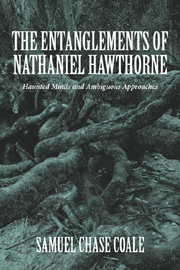Book contents
- Frontmatter
- Contents
- Acknowledgments
- List of Abbreviations
- Introduction: Entanglements
- 1 The Legacy of The Scarlet Letter: Hawthorne in Contemporary Culture
- 2 Hawthorne as Nineteenth-Century Morbid Genius
- 3 Biographical and Critical Veils in the Nineteenth Century
- 4 Biographical Visions of the Twentieth Century
- 5 Entangled Polarities: The New Criticism
- 6 Doubting Dualisms: The Strategies of Hawthorne's Romance
- 7 Ideological Contexts: Deconstruction, Feminism, the New Historicism, Race, and Entanglement
- Works Cited
- Index
7 - Ideological Contexts: Deconstruction, Feminism, the New Historicism, Race, and Entanglement
Published online by Cambridge University Press: 12 September 2012
- Frontmatter
- Contents
- Acknowledgments
- List of Abbreviations
- Introduction: Entanglements
- 1 The Legacy of The Scarlet Letter: Hawthorne in Contemporary Culture
- 2 Hawthorne as Nineteenth-Century Morbid Genius
- 3 Biographical and Critical Veils in the Nineteenth Century
- 4 Biographical Visions of the Twentieth Century
- 5 Entangled Polarities: The New Criticism
- 6 Doubting Dualisms: The Strategies of Hawthorne's Romance
- 7 Ideological Contexts: Deconstruction, Feminism, the New Historicism, Race, and Entanglement
- Works Cited
- Index
Summary
From the New Criticism to Ideological Criticism
In the 1960s and 1970s deconstruction, which undermined not only the various dualisms that seemed permanently attached to the nineteenth-and early twentieth-century critical approaches to Hawthorne as man and artist but also the assumptions and strategies of the New Criticism and psychological approaches of the mid-twentieth century, was not the only critical revolution that occurred. Feminist criticism also flourished, as did other perspectives that included those of African American writers and critics and those of Marxist critics with their concerns of class and ideology. In general these can be seen as part of a tendency toward a thorough exploration of the traditional American literary canon and how it was constructed. The roles seen to have been played by women in Hawthorne's life — Sophia Peabody Hawthorne, Elizabeth Palmer Peabody, Elizabeth Hawthorne, Margaret Fuller and others — underwent a significant shift from spouse and/or acquaintance to collaborator and subject. The New Critical obeisance to unity broke down, as texts revealed fissures and inconsistencies, as well as traces from previous texts. Cultural compulsions were unearthed and exposed that shaped Hawthorne's idea of women, African Americans, the male role in a capitalist society, and the stratification of class both of the Puritan era and of Hawthorne's own.
The overall difference in critical approaches to Hawthorne's work emerges most clearly when we compare Lionel Trilling's famous essay of 1964, “Our Hawthorne,” to Gordon Hutner's “Whose Hawthorne?” of 2004. Trilling’s essay all but announces the end of the New Critical era. He upbraids Henry James for denying “the darkness of Hawthorne’s mind” (431) and at the same time praises Hawthorne’s strategy of ambiguity as the core of humanity’s moral nature. He recognizes that Hawthorne’s rise as the subject of critical study coincided with the rise of the New Criticism influenced as it was by T. S. Eliot’s notion that literature casts primal spells and is itself “an expression of belief in the magical force and authority of words and their arrangement” (436).
- Type
- Chapter
- Information
- The Entanglements of Nathaniel HawthorneHaunted Minds and Ambiguous Approaches, pp. 136 - 166Publisher: Boydell & BrewerPrint publication year: 2011



